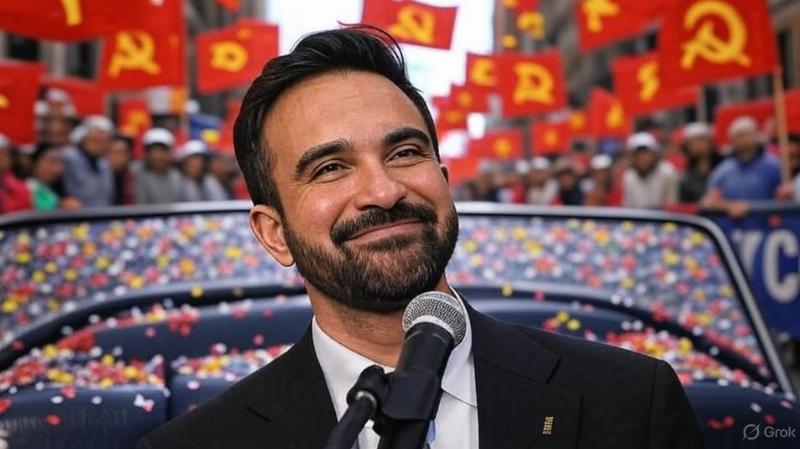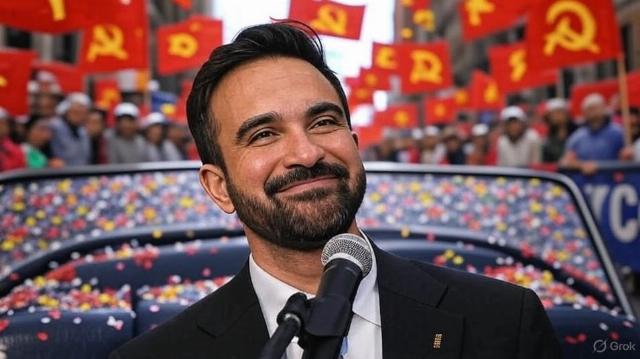


In the old meritocratic Ivy League—which is to say, generations ago—ambition came decked out in stellar academic achievement, extracurricular discipline, and character.
No more. In this more “enlightened” era, it is a host of contradictions all crosswise with traditional notions of accomplishment: “lived experience,” narrative flair, and just the right selected racial checkbox. Facts be damned.
Perhaps no better case study exists than Zohran Mamdani, the self-styled “democratic socialist” (as if the world needed another—Kim Jong Un is more than enough), and current New York City mayoral candidate, whose life of progressive posturing is matched only by the identity hustle that helped launch his academic ascent.
According to The New York Times and confirmed reporting, Mamdani—of Indian ancestry, born in Uganda—checked the box for “Black or African American” on his Columbia University undergraduate application. He claims he also selected “Asian,” but who really knows at this point? And that’s the point, isn’t it?
He did so despite knowing full well he is not, by any conventional understanding, racially black, nor the descendant of the African American experience that box is meant to capture. Not even close. And he did it while applying to the very university where his father holds an endowed chair.
This wasn’t confusion. It sure wasn’t cultural ambiguity.
No, it was simply the latest chapter in the Zohscam mythos.
Mamdani did not come from the margins of society to apply to Columbia. He is the son of Dr. Mahmood Mamdani, a globally renowned scholar who holds the Herbert Lehman Professorship in Government—at the very same Columbia.
His father specializes in African and international politics, colonialism and post-colonialism, and the politics of knowledge production—precisely the disciplines that perpetuate and project racial identity as the lens through which all of life must be filtered.
Philosophy, economics, sociology—nearly everything in the Dewey Decimal System is to be analyzed, categorized, and divided accordingly, so that winners and losers can be assigned not by merit, but by carefully selected narrative.
It seems Zohran’s narrative was more carefully selected than most.
Dr. Mamdani also serves as chancellor of Kampala International University in Uganda, and is considered by liberal academia to be one of the foremost thinkers on racism, colonialism, and the litany of other “-isms” they are simultaneously attempting to shatter and amplify.
Yeah, it’s a massive contradiction—but so is the entirety of the progressivist worldview. That’s a discussion for another day.
The bottom line for today’s discussion is this: if anyone understands the distinction between ethnicity and race, national origin and racial identity, it is the Mamdani household.
And yet, when presented with a college application form that invited racial signaling, Zohran responded with strategic clarity.
Because when truth, biology, gender, and social norms are fluid, so is racial identity.
And let’s be clear—the inculcation of identity in the Mamdani household wasn’t strictly a consequence of patriarchy.
His mother, Mira Nair, is a celebrated—if not consistently commercially successful (capitalism strikes again!)—filmmaker whose work often probes questions of identity, displacement, and assimilation. She’s quite popular with the NPR set.
In 2006, she directed The Namesake, adapted from Jhumpa Lahiri’s Pulitzer Prize-winning novel. The film follows the son of Indian immigrants as he attempts to forge an American identity in New York City while navigating his family’s rich cultural heritage.
It is, ironically, a meditation on authentic identity—what we inherit, what we shed, and what we pretend to be.
Yet in real life, her son took a very different approach. Rather than wrestle with the complexity of heritage, he kicked it to the Mamdani household curb—recasting his Indian ancestry and Ugandan birth as a claim to black American identity.
Simply put, Zohran’s box-checking was a crass, opportunistic misrepresentation.
Even more simply put—he was full of crap.
At the time, Columbia’s admitted student range for SAT scores spanned roughly 2,110 to 2,300. Mamdani’s reported score was 2,140—on the lower end of admissibility and, what do you know, below average for Asian or white applicants.
But Columbia’s race-conscious system treated racial identity as a big deal. Mamdani no doubt understood this well. The box served as his hoped-for trump card.
Even so, Mamdani went elsewhere for his collegiate studies, escaping the friendly confines of Manhattan to attend Bowdoin College in the state of Maine. Bowdoin is a fine school, to be sure, but it doesn’t quite exude the same New York elite progressive privilege as Columbia does. Read into that what you wish.
So when the rubber hit the road, Zohran Mamdani engaged in racial appropriation in pursuit of educational advantage, leveraging a race-based selection system to try to secure a seat in the Ivy League.
What a revoltin’ development this is for Manhattan’s wannabe revolutionary’s chances to land in Gracie Mansion.
This is a scandal that, in a fair and just world, would be hard to shake.
But the world is neither fair nor just.
And given the gossamer flimsiness of the radical left’s intellectual honesty, young Mr. Mamdani will no doubt offer breezy explanations, pivot to his radical agenda, and double down on his not-so-subtle social media posturing.
He will keep his focus on “fighting the system”—the very system that has afforded his family means and comfort few in Uganda, or the Indian subcontinent, could ever attain.
And note well: many of the same voices now rushing to excuse Mamdani’s racial self-reinvention—claiming that identity is fluid, heritage is complicated, and criticism is reactionary (or that it was just a little oopsie)—are the very same voices who mock Afrikaans-speaking South African farmers, families who have lived in the region for generations, as illegitimate asylum seekers when they flee racial violence and systemic discrimination.
Identity, it seems, is only sacred when it serves the narrative and advances the progressive agenda—all determined by an elite who, mind you, are doing very well in a system they have rigged.
A system that not only deserves to be shattered, but is already collapsing under the weight of its foundational hypocrisy.
And the sad reality for the city that never sleeps?
Whoever did the vetting on this beguiling little Bolshevik in the Democrat primary was clearly asleep at the wheel.
Now, here’s where things get interesting.
The New York flippin’ Times broke this story—months out from the general election. Ordinarily, the Times can be counted on to carry water, mop floors, and launder the record for whoever the Democrat nominee happens to be in New York City.
But this time?
Perhaps “Zohscam” Mamdani is a bridge too far for the house organ of Establishment, Inc.
And you read Zohscam here first.
Which brings me to my final point:
Does Eric Adams—or Andrew Cuomo—have nine lives or what?
Charlton Allen is an attorney and former chief executive officer and chief judicial officer of the North Carolina Industrial Commission. He is founder of the Madison Center for Law & Liberty, Inc., editor of The American Salient, and host of the Modern Federalist podcast. His commentary has been featured in American Thinker and linked across multiple RealClear platforms, including RealClearPolitics, RealClearWorld, RealClearDefense, RealClearHistory, and RealClearPolicy. X: @CharltonAllenNC

Image generated by AI.
